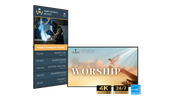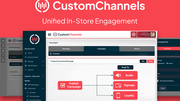Blog
Gained in translation
June 5, 2012 by Larry Zoll — Senior Associate, Sensory Interactive
One of the most valuable lessons I've learned as a lighting designer is how to be a translator. Lighting is an extremely difficult property to talk about because it's intangible, and as such requires its own special vocabulary. I understand that not everyone I talk to will have that vocabulary, so I have to translate. I have to translate what a client actually needs based on what they describe, and then I have to translate back to them in words that will create a meaningful imagery. This technical translation is an unbelievably useful skill, and it becomes increasingly transferrable as I try to understand what a client needs in all aspects of a project.
I've never been afraid to get my hands dirty, and I think that is one of the reasons I've been able to be such an effective translator. In order for any of us to really get into the minds of any of our clients we need to be able to have the firsthand experience to back up our recommendations — if not, what makes us any more knowledgeable than those we're trying to create for?
I haven't had to do this in a long time, but recently I've been working on a project that has taken me to some very unfamiliar territory — software development and programming. This is a scary place for most of us because it is also intangible in a very real way. I need to be able to communicate the needs of the client I've been working with to our software development team in a way that they both can understand so that the client gets the interfaces they need and the devs get all of pertinent information they need to create first class software.
In order to make the whole process as smooth as possible I felt the best way to really communicate with everyone effectively was to learn some basic programming myself. Now I'm not trying to go and become the next Jobs or Zuckerberg, so it's pretty easy to find some resources out there to give you a basic understanding of what it takes to put software together. I've been using www.codeacademy.com, which will teach you the basics of a few different languages and strategies. It hasn't made me an expert, but it has given me the ability to have an intelligent conversation and understand concepts. It's given me the perspective I need to help be that translator.
Whether or not it's something that you're conscious of, this translation is a vital part of our industry. We work with systems that most people assume they understand, but in reality need help from the artists and technicians that make up the DOOH industry to truly achieve the results they've envisioned. Keep that in the back of your mind — use your knowledge to extract your client's wishes along with what they think they need, and do whatever you need to do to help them get there. It's the only way we'll keep moving the industry forward in a positive, innovative direction.
 ChatGPT
ChatGPT Grok
Grok Perplexity
Perplexity Claude
Claude






